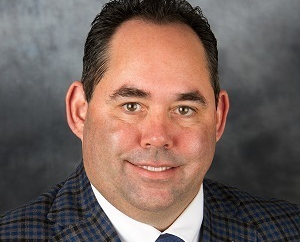MOUNT VERNON - St. Clair County Associate Judge Jeffrey Watson erred when he failed to conduct a preliminary hearing, ruining a criminal trial and making the prospect of further proceedings "ludicrous," according to Fifth District appellate judges.
- “With respect to the appropriate remedy for this constitutional violation, we believe that to grant the defendant a probable cause hearing after his constitutional rights have already been violated would be ludicrous.
The appellate court ruled on March 5 that Watson failed to conduct a preliminary hearing for felony defendant Anzano Chambliss as the state constitution required.
The constitution’s only exception applies to subjects of grand jury indictments.
Justices Michael McHaney, Thomas Welch and Judy Cates reversed Chambliss’s conviction on a Perry County jury verdict and vacated a four year sentence that Watson imposed.
Watson currently presides only in St. Clair County Circuit Court, but two years ago Perry and St. Clair counties both belonged to the 20th Judicial Circuit.
McHaney wrote, “There is no doubt this case was fraught with disruption and delay, much of it attributable to the defendant.”
“Nonetheless the error in this case was neither harmless nor excusable,” he wrote.
Chambliss allegedly struck two women outside a DuQuoin liquor store in 2021.
State’s attorney David Searby requested a special prosecutor because Chambliss had filed a civil suit against Assistant State’s Attorney David Stanton.
Chief Illinois Appellate Prosecutor Patrick Delfino appointed David Rands, who filed criminal information charging Chambliss with aggravated battery.
McHaney wrote, “When the defendant was arrested he had a pending misdemeanor in which the issue of his fitness to stand trial had been raised but not resolved.”
Matt Foster of Pinckneyville represented Chambliss; but at a hearing in 2022, Chambliss told Watson he wanted Foster to withdraw.
Chambliss was found fit, Watson granted Foster’s withdrawal, and Chambliss proceeded to trial without counsel.
Witness Emily Barnes testified that he approached her and Carolyn Spell, smelling of liquor and shouting obscenities.
Barnes said he spat on her and punched the side of her face, knocking her down.
She said he kept striking her.
Spell testified she tried to get Chambliss off Barnes, and he pushed her to the ground.
The state produced evidence that two correctional officers stopped the attack.
Jurors found Chambliss guilty, and Watson sentenced him.
Chambliss hadn’t raised the issue of a preliminary hearing, but he raised it on appeal.
Fifth District judges found he forfeited the issue, but they can consider unpreserved claims of error in specific circumstances.
McHaney wrote that the primary function of a preliminary hearing is to determine whether there is sufficient indication that the accused committed a crime to justify his further detention.
He wrote that preliminary examination is critically important because it affords protection to the accused and it relates to arrest, bail, prosecutorial discretion, grand jury and trial.
McHaney quoted an author who called it an early and independent check on the initial decision of the police or the district attorney to prosecute.
He quoted a decision of the U.S. Supreme Court that each state must provide a fair and reliable determination of probable cause as a condition for restraint of liberty before trial.
He also quoted a decision of the Court that counsel at a preliminary hearing might discover strengths and weaknesses in a case and might preserve or suppress evidence.
And he quoted People v. Kirkley, a Third District decision reversing convictions where grand jurors indicted defendants 176 days after their arrest.
“We find that the facts of this case are more egregious than the facts in Kirkley.
“Here, the state never set forth its foundation for the charge against the defendant and never confirmed that the defendant was the individual who allegedly committed the crime.
“With respect to the appropriate remedy for this constitutional violation, we believe that to grant the defendant a probable cause hearing after his constitutional rights have already been violated would be ludicrous.
“Trial courts and courts of review have a solemn duty to safeguard the rights of every person to procedural due process when charged with a serious offense and to apply the law in an equal and fair manner.
“That has now been done here,” McHaney wrote.
Appellate defenders James Chadd, Ellen Curry and Julie Thompson represented Chambliss.
Special prosecutor Rands represented the people at trial and at the appellate court.
Applicable Laws
Article I, Section 7 of the Illinois Constitution:
“No person shall be held to answer for a crime punishable by death or by imprisonment in the penitentiary unless either the initial charge has been brought by indictment of a grand jury or the person has been given a prompt preliminary hearing to establish probable cause.”
Code of Criminal Procedure:
Every person in the custody of this state for the alleged commission of a felony shall receive either a preliminary examination…or an indictment by grand jury…within 30 days from the date he or she was taken into custody.”
